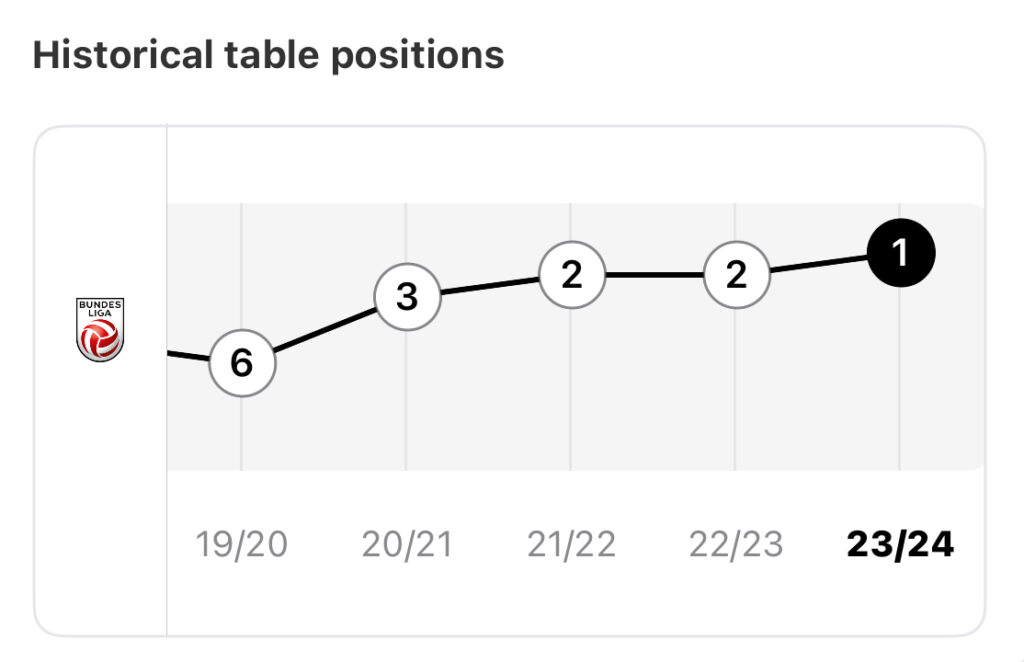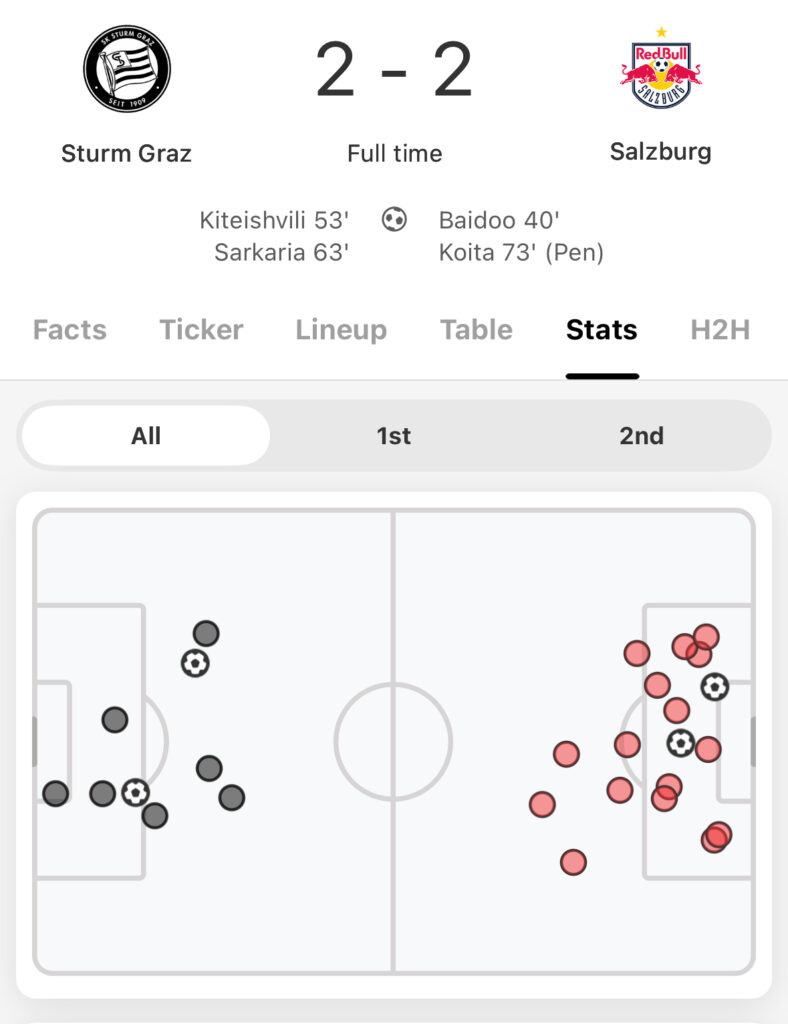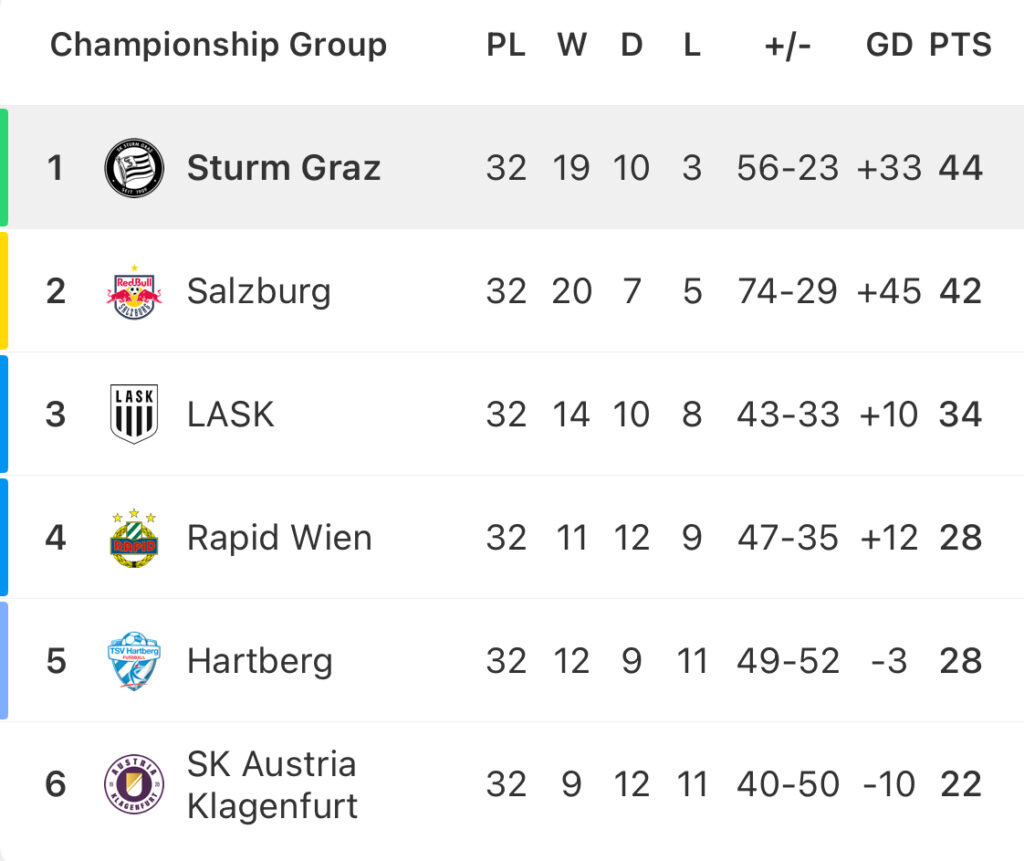Sturm Graz end Red Bull dominance in Austria
Much like Bayern Munich in its German counterpart, the Austrian Bundesliga has been a broken record for the past decade. Red Bull Salzburg, a subsidiary of the famous energy drink conglomerate have dominated, and much like this season in Germany, that domination has been ended by a loveable underdog.
By Alex Roberts
When Red Bull bought SV Austria Salzburg, changed the club’s colours and renamed it back in 2005, Dietrich Mateschitz, co-founder of the company, declared “this is a new club with no history”. Since then, they’ve been on a tyrannical tirade to monopolize the Austrian Bundesliga.
They’ve won 14 of the last 19 league titles, outspending and overpowering all those who dare challenge the mighty Red Bull machine. Financially, other Austrian clubs simply can’t compete with Salzburg so they have to be smarter.
Before this season, Sturm Graz had only won three Austrian Bundesliga titles throughout their history. Now they have four. They’ve had to play the long game, but the hard work has finally paid off.
Since 2009 Die Schwoazn have consistently played continental football, either in the Champions League or it’s more hipster cousin, the Europa League. They even won the league in 2010/11, but Salzburg were a different beast back then.

While continental qualification and a league title in that time is impressive, it wasn’t until when current manager Christian Ilzer was hired in 2020 that things really started to shift.
Ilzer employs a 4-4-2 diamond formation for his Sturm Graz team, maintaining this shape consistently from match to match. However, the formation often shifts during attacking and pressing phases.
Due to the formation’s narrowness, Ilzer relies on his full-backs to advance into the attacking third and provide width, essentially becoming wingers when Sturm Graz are in possession.
Many of the team’s creative attacking moments originate from the wide channels, with the full-backs playing a crucial role during the more cautious build-up phases.
Typical of many Austro-German teams, Sturm Graz press hard, but they don’t seek to dominate possession, instead using their rapid pace to counterattack once they do gain the ball back from their opposition.
The summer transfer window saw Ilzer’s side lose Dutch striker, Emanuel Emegha to French side Strasbourg for around €13 million, the second highest fee received for a player, just behind Rasmus Højlund who joined Atalanta from the club for €20 million.
Around €5 million of that €13 million was spent on incoming players, most notably forwards Seedy Jatta from Valerenga, Szymon Wlodarczyk from Polish side Gornik Zabrze, and goalkeeper Kjell Scherpen on loan from Brighton.
The Austrian Bundesliga isn’t like most other European leagues. Twelve teams compete in a double round-robin format, where each team plays every other team twice at home and twice away over the course of a championship year.
This year is divided into an autumn season and a spring season, typically running from July to June of the following year. At the end of the season, the team that finishes last in the standings is relegated to the 2. Liga, while the champion of the 2. Liga is promoted to the Bundesliga.
Sturm Graz started their league campaign against Austria Wien, one of the bigger clubs from the pre-Red Bull era that have since fallen away. Sturm walked away with it, winning 3-0 thanks to goals from Jusuf Gazibegović, Wlodarczyk, and David Affengruber. It was the perfect start to the season.
The first inevitable face-off with Salzburg came in mid-September. The Liebenauer Stadium in the beautiful city of Graz pulsated with anticipation as David got ready to take on Goliath.
The visitors opened the scoring through centre-back Samson Baidoo in the 40th minute, but Strum Graz equalised just 13 minutes later thanks to Georgian playmaker Otar Kiteishvili.
Not long after they took the lead but they couldn’t hold on and the game ended 2-2 after Salzburg forward, Sekou Koita bagged a penalty in the 73rd minute. It was a stalemate, but it could have been worse.

From the start of the season, they would then go on an unbeaten run of ten games before eventually losing at home to the club they battered on the first day of the season. Austria Wien got their vengeance with a fairly comfortable 1-0 win.
Their next game wasn’t any better, in fact it was worse. Sturm Graz’s visit to LASK ended with a disappointing 3-1 defeat. But something incredible was happening, Red Bull Salzburg were also faltering. A couple of defeats weren’t the end of a title charge like it had been in previous years.
These dropped points were crucial as the regular season came and went with Salzburg at the top of the table on 50 points, and Sturm Graz just behind them on 46.
Again, the format for the Austrian Bundesliga is a little tricky. The points obtained during the regular season were halved and rounded down before the start of the playoff. As a result, the teams started with the following points before the playoff: Red Bull Salzburg 25, Sturm Graz 23, LASK 17, Austria Klagenfurt 17, TSV Hartberg 17, and Rapid Wien 16. The points of LASK and Rapid Wien were rounded down.
Now, with all the logistics out of the way, we can get back to the football.
Just four minutes into their play-off campaign, Sturm Graz scored their first goal. Mika Biereth opened the scoring against Austria Klagenfurt before doubling their lead 14 minutes later. Tomi Horvat and William Bøving then added goals just before halftime to make it 4-0 and it ended that way.
A 2-0 defeat in their next game against Blau-Weiss Linz ruined any kind of momentum as they prepared to face Salzburg in the game after. It ended 1-0 to the Red Bull machine, Mads Bidstrup with a lovely volley on the 48th minute.
Most of the drama happened in the last few minutes. The ref issued three red cards in the dying embers of the game after a on field disagreement between the two squads. Jon Gorenc Stankovic and Dimitri Lavalee were sent off for Sturm Graz, while Lucas Gourna-Douath saw red for Salzburg.
The two sides would the face each other again just a few days later in the Austrian Cup semi-final. This time, red cards were replaced by goal. Sturm Won the game 4-3 to get to the final.
While Sturm Graz were picking up points, Salzbrug were dropping them. Four straight victories placed them at the top of the table for the first time since matchday nine with just a few games remaining.
Defeats against LASK, SK Austria Klagenfurt, and Rapid Vienna, as well as draws against Rapid Vienna and a 2-2 tie with Sturm Graz in their last seven games left Salzburg clutching at straws. It would go down to the final day, either Salzburg would win the title again, or Sturm Graz would do something no other Austrian side had done in a decade.
Thirty-six minutes into the last games of the season, it looked like normal business would resume. Salzburg were 3-1 up against LASK, walking away with it, they already had one hand on the trophy.
Back in Graz, the first half came and went without a single goal. They knew they had to win if they wanted to lift the trophy, they couldn’t rely on LASK doing them any favours. Then, on the 69th minute, centre back Gregory Wüthrich made the breakthrough with a well-timed header from a corner.
As things stood, Sturm Graz would win the league regardless of what happened in Salzburg (by this point they were winning 5-1). It was still tense though; a 1-0 lead is never comfortable.
Finally, on the 90th minute, Sturm Graz’s collective blood pressure dropped. Fans, players, and staff alike could finally breathe a sigh of relief when Amady Camara slotted home to confirm the win and the Austrian Bundesliga title.
Breaking Red Bull’s monopoly on the league is an incredible feat but now starts the hard work, trying to retain it. Salzburg will come again, it’s up to sides like Sturm Graz to make sure they can’t walk it like they used to.

(Cover image from IMAGO)
You can follow every game from the Austrian Bundesliga live with FotMob — featuring deep stats coverage including xG, shot maps, and player ratings. Download the free app here.